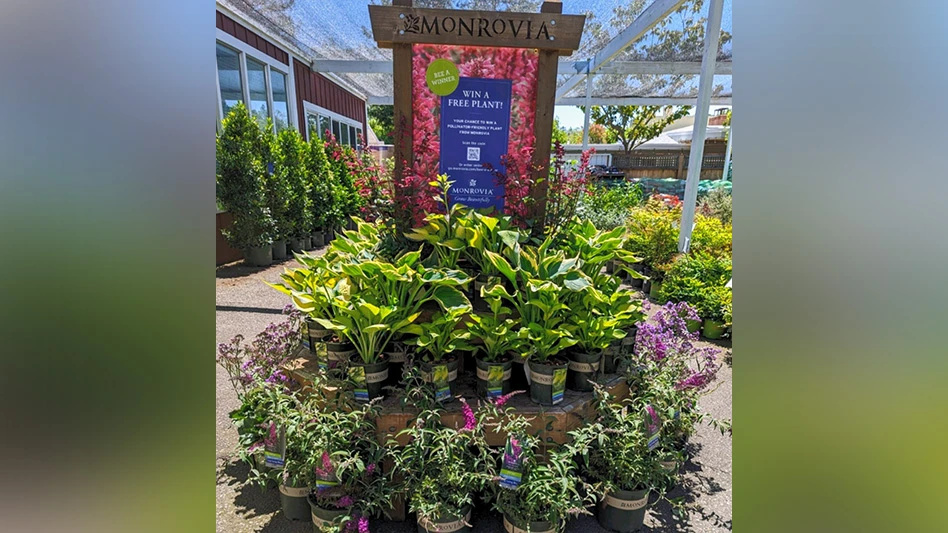
 I always told my staff during my time at an independent garden center the following: “Customers take all the questions they can’t get answered and expectations that can’t be met at the big box stores and they put them in a bag. They then bring that bag to you each time they visit. They dump that bag out at the service desk. The second you can’t deliver on those questions and expectations, they’re disappointed. They expect us to be better before they ever walk in the door.”
I always told my staff during my time at an independent garden center the following: “Customers take all the questions they can’t get answered and expectations that can’t be met at the big box stores and they put them in a bag. They then bring that bag to you each time they visit. They dump that bag out at the service desk. The second you can’t deliver on those questions and expectations, they’re disappointed. They expect us to be better before they ever walk in the door.”
We all know that training and retaining staff can be one of the toughest tasks a garden center manager has on their plate. Yet, it’s often one that gets neglected or pushed to the backburner because it can seem so daunting. I don’t have time. I have to deal with all these customers! Sound familiar?
We’ve all been there. But the bottom line is, without smart, friendly staff that differentiate you from mass merchants, the kind of sales you want just don’t happen.
Training is tricky, but the ability to train well is greatly enhanced by having the right recruits. It is a delicate dance between personality and knowledge. I’ve both hired and fired plenty of people who were on both ends of the spectrum. In retail, there can be too much of a good thing.
Hire an encyclopedia and your customers may just end up getting lots of free advice and no plants in their shopping cards. Hire a sunny personality with little to no gardening chops and your customers may end up with lots of the wrong plants in their cart. Both scenarios are a lose/lose proposition.
Customers are mostly looking for someone who will listen to them, be patient with them and match their needs to the right solution. Beyond that, they’re looking for someone to throw in a bit of unexpected inspiration.
They don’t need to listen to a dissertation every time they come into the garden center. But they expect independent garden centers to be the most knowledgeable when it comes to teaching them how to be good gardeners.
What you’re really selling to your customer is success. The way to do that is to hire and train people who know plants and like people. Then give them the tools and training in order to advance both their knowledge and your customers’ knowledge.
Some of my favorite training tips are:
• Put words in their mouths
Writing “scripts” was one of the most effective and successful training tools I employed. Probably the most successful tool. Staff members often don’t know what they should be saying to customers in certain situations unless you tell them. How do you want them representing you? Employees can harbor a lot of anxiety about things like doing returns if they aren’t sure exactly what to say or how to say it. Write out scripts for a multitude of scenarios for your staff that include both potential customer comments and questions and acceptable staff answers. At training meetings, you should role play with the scripts. Teach them how to say what you want them to say. “Verbiage” is what I called it with my staff. It was especially helpful for phone training. It got to the point where a cashier would say to me, “Hey Leslie, can you write me some verbiage on that situation?” Sure thing!
• Learn by teaching
 Sure, Product Knowledge (PK) sessions led by product reps can be a good way to train your staff. But I found that having the sales staff themselves teach the PK sessions was often more productive. As you probably know, being assigned to teach a topic often forces you to learn the topic. Each week at our sales meeting one of our salespeople (garden advisers) would spend 15 to 20 minutes covering a plant, product or a group of them within a project sale. Your staff can volunteer to sign up for future meetings or you can assign them. Plants and products covered needed to be seasonally relevant and staff members should do their research before their presentation.
Sure, Product Knowledge (PK) sessions led by product reps can be a good way to train your staff. But I found that having the sales staff themselves teach the PK sessions was often more productive. As you probably know, being assigned to teach a topic often forces you to learn the topic. Each week at our sales meeting one of our salespeople (garden advisers) would spend 15 to 20 minutes covering a plant, product or a group of them within a project sale. Your staff can volunteer to sign up for future meetings or you can assign them. Plants and products covered needed to be seasonally relevant and staff members should do their research before their presentation.
• Employ the buddy system
I had a rule that all new employees should be buddied up with a seasoned staff member for two weeks before they were left to their own devices. Now, it didn’t always stick 100 percent of the time, as seasoned staff inevitably gets pulled away, but it was overall a good method to keep newbies from feeling lost or overwhelmed. That’s a tough promise to keep once spring hits, so it’s key to get new staff on board before you get slammed, so they have a little time to acclimate and absorb their training.
• Take field trips
Myopia. Nearsightedness can affect us not only physically, but also in our work life. You have to get out of the garden center now and then to see what’s new and to get a fresh perspective. Your staff desperately needs that as opportunity as well. How do they know what to shoot for unless they see what the competition does well? Want them to create better displays? Send them on a field trip to your favorite retailer to get ideas. While you should send your staff around to the other local IGCs, you should also send them to the hip new floral shops and home décor retailers in your area that do a good job of merchandising and providing excellent customer service. Local field trips not only refresh employees by shaking up their daily routine, but also spur inspiration and creativity. Staff feels valued when you trust them to leave their post to learn.
• Profession matters
If your profession didn’t have value, you wouldn’t have customers asking you horticultural questions all day long. Hire professionals and pay them a decent wage. It’s not common to find someone with a horticulture or related degree who wants to work retail, but it does happen. Grab that unicorn by the horn and cultivate their desire to stick with you. They can be your “training hub” for the rest of the staff that comes in with less knowledge or experience.
If they don’t have them upon hiring, require your new staff attain professional certifications within a certain amount of time. Then facilitate the certification. Certifications provided by your state’s nursery and landscape associations give your staff a path to growth and make them more credible in your customers’ eyes. Encourage them to also pursue additional national certifications. Certification is good for business. Purchase the study manuals, if they are in hardcopy, and let your staff check them out. My staff would organize study groups for those who were preparing to take certification exams. If you can provide study space and time for staff or participate in the study preparation, even better. Cover the cost of their testing fees, once they provide proof of passing the exams. It’s a good training tool and motivator. Incentivize staff with a raise once certification has been attained.
• Never stop training
While there are many other successful ways train retail garden center staff, the most important tip is to never stop trying. Keep at it and adapt your training to fit the season and new staff. Different personalities and generations respond to different types of training so don’t be afraid to make changes and adapt.
Leslie Finical Halleck owns Halleck Horticultural, LLC, through which she provides horticultural content marketing, social media management and strategy consulting for green industry businesses. Leslie is a Certified Professional Horticulturist (CPH) via ASHS, with more than 20 years of industry experience. She previously worked at North Haven Gardens and was Director of Horticulture Research at The Dallas Arboretum. www.lesliehalleck.com
Hear more training tips from Leslie in the “Build a stronger team” podcast in the Retailer Radio Network podcast
station on iTunes.

Explore the April 2014 Issue
Check out more from this issue and find your next story to read.
Latest from Garden Center
- This Florida garden center's busiest days are in the fall, not spring. Find out how they do it
- Terra Nova Nurseries releases new agastache variety, 'Peach Pearl'
- The Certified Shopify Online Garden Center provides local retailers with ecommerce tool
- Meet the All-America Selections AAS winners for 2025
- Endless Summer hydrangeas and Suntory Senetti glam up Grammys red carpet
- Ball Seed releases 2025 edition of 'Thrive and Flourish' for landscape and garden retail
- American Floral Endowment's Fred C. Gloeckner Foundation Research Fund accepting grant proposals
- Floral Marketing Fund and CalFlowers partner to advance floral industry





